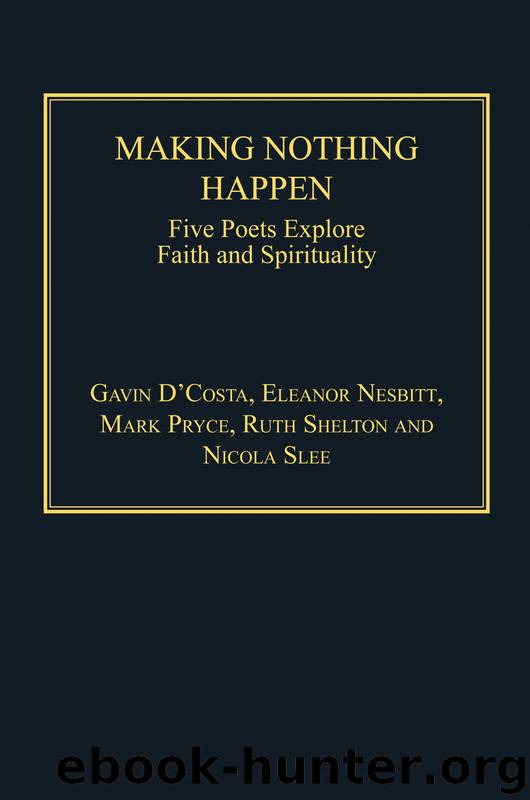Making Nothing Happen by D'Costa Gavin. Shelton Ruth. Slee Nicola. Nesbitt Eleanor. Pryce Mark

Author:D'Costa, Gavin.,Shelton, Ruth.,Slee, Nicola.,Nesbitt, Eleanor.,Pryce, Mark.
Language: eng
Format: epub
Publisher: Ashgate Publishing Ltd.
Published: 2014-03-14T16:00:00+00:00
The Prophetic and Liberative Imperative of Poetry
‘“…we have to celebrate – this brother of yours was dead and has come to life, he was lost and has been found”.’
The elder brother has grown comfortable with his accustomed dialogue between father and son; he had not known that there were voices missing, nor is he keen to hear an unfamiliar story. The father wants to hear the story of the son and to celebrate its telling; he wants to raise up the fallen child with dignity and honour the one who shares his brokenness and sin: the imagination will not exclude what may count as marginal, nor can it overlook injustice. The imagination is prophetic (Brueggemann, 1983, 1989) in its call for integrity and lived moral courage, and the language of the prophets is poetry, which interrogates, inspires, convicts and inflames the hearts of the faithful. Pastoral and Practical Theologians have emphasised this capacity of poetry to foster critical reflection on experience in a manner which grasps the shape and significance of events in ways which are expansive rather than reductionist. A poem can attend to the particular and specific, even to the momentary, distilling meaning in ways which are profoundly faithful to the given-ness of the event but open up new possibilities, different interpretations, attending to and re-framing experience (Capps, 1993).
The power of language is fundamental in re-fashioning human identity and experience, and poetry focuses this, drawing attention to the connections or fractures between experience, idealogies, words and meanings. Poetical language seeks to animate the imagination and to stir the heart through use of language as a life-enhancing, transformational resource in new ideas and understandings (Alves, 1990; Pattison and Woodward, 1994; Pattison, 2000). Practical Theology even describes its approach as ‘poetical’ in its hermeneutical, transformational task, telling and re-telling narratives, making and re-making the socially constructed world of our theory and practice (Veling, 2005). In poetry, excluded individuals and groups have a seat at the table and find a voice which is powerful because it is authentic, speaking out of experience and context in ways which do justice to complex situations through its capacity for nuanced multivalency. Indeed, Ellen Davis suggests that such a large proportion of the words of the Hebrew Scriptures are in poetic form because poetry is the language ‘best suited to probing the inexhaustible mystery of the human situation in its entirety … poetry looks at phenomena whole’ (Davis, 2000: 19).
Download
This site does not store any files on its server. We only index and link to content provided by other sites. Please contact the content providers to delete copyright contents if any and email us, we'll remove relevant links or contents immediately.
The Art of Boudoir Photography: How to Create Stunning Photographs of Women by Christa Meola(18629)
Red Sparrow by Jason Matthews(5476)
Harry Potter 02 & The Chamber Of Secrets (Illustrated) by J.K. Rowling(3677)
In a Sunburned Country by Bill Bryson(3544)
Drawing Cutting Edge Anatomy by Christopher Hart(3529)
Figure Drawing for Artists by Steve Huston(3452)
Harry Potter and the Prisoner of Azkaban (Book 3) by J. K. Rowling(3360)
The Daily Stoic by Holiday Ryan & Hanselman Stephen(3325)
Japanese Design by Patricia J. Graham(3178)
The Roots of Romanticism (Second Edition) by Berlin Isaiah Hardy Henry Gray John(2918)
Make Comics Like the Pros by Greg Pak(2918)
Stacked Decks by The Rotenberg Collection(2883)
Harry Potter and the Deathly Hallows (7) by J.K. Rowling(2726)
Draw-A-Saurus by James Silvani(2719)
Tattoo Art by Doralba Picerno(2670)
On Photography by Susan Sontag(2640)
Churchill by Paul Johnson(2587)
The Daily Stoic by Ryan Holiday & Stephen Hanselman(2579)
Drawing and Painting Birds by Tim Wootton(2512)
